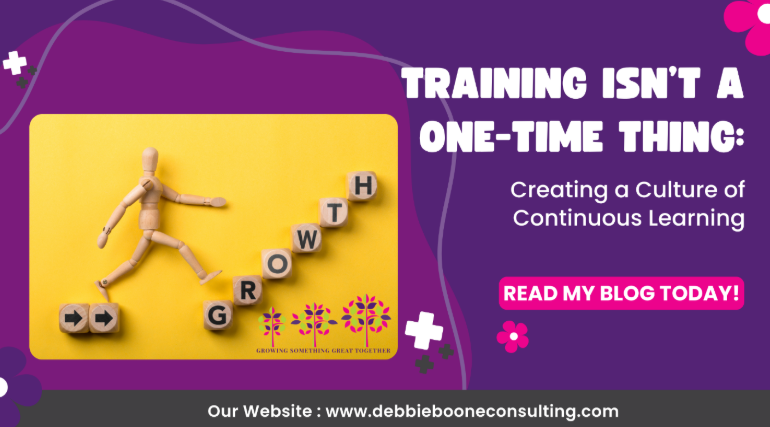
One of the biggest myths in veterinary practice management? That training is something you do once, while onboarding, and then you can check it off your list.
If you want a team that grows, connects with clients, and keeps pace with change, you need more than an orientation binder. You need a culture of continuous learning.
Why One-and-Done Training Fails
I can’t tell you how many practices I’ve visited where the front desk staff was handed a manual on Day One, shadowed for a couple of hours, and then left to figure things out.
Then management wonders why:
- Phone calls are inconsistent
- Clients don’t feel heard
- Mistakes repeat themselves
Training isn’t a one-time event—it’s an ongoing process. Without reinforcement, skills fade. Without feedback, bad habits form.
Growth-Minded Teams Deliver Better Care
Teams who keep learning don’t just perform better, they connect better. They stay curious. They adapt more easily. And they take more pride in their work.
That mindset shows up in client interactions. Clients sense when your team is confident, capable, and in sync. They trust you more.
Make Learning Part of the Routine
You don’t need a big budget or hours of extra time. Learning can be built into your daily rhythm:
- Morning huddles: A quick 5-minute tip or scenario to discuss.
- Micro-trainings: Bite-sized lessons on service, systems, or teamwork.
- Peer mentoring: Encourage experienced staff to share their best practices.
- Monthly refreshers: A deeper dive into frequently missed steps or policy changes.
The key is consistency, not perfection.
Training for Hospitality, Not Just Tasks
Most practices train people on what to do, such as how to check in a patient and process a payment.
But hospitality is about how you do it. What tone are you using? Are you making eye contact? Are you explaining the next steps in a calming way?
Role-playing real client scenarios is one of the best ways to build this skill. It can feel awkward at first, but it’s powerful. It builds confidence and empathy.
Empowered Staff = Engaged Staff
When people feel competent, they tend to feel more confident. And when they feel confident, they’re more likely to:
- Take initiative
- Solve problems independently
- Support their teammates
Ongoing training sends the message: “We believe in you. We want to invest in you.” That message matters.
Your Commitment Shows
Clients can tell the difference between a team that’s just going through the motions and a team that’s been trained to care.
They notice when your team:
- Anticipates their needs
- Offers clear explanations
- Handles hiccups gracefully
That level of polish doesn’t happen by accident. It’s built through intentional, consistent learning.
Learn the System
In my book, Hospitality in Healthcare, I lay out real-world systems and scripts that help teams deliver five-star service, without sounding robotic.
I believe training should feel empowering, not exhausting. It should lift people, not weigh them down. And most of all, it should never, ever stop.
Because in veterinary medicine, the more we learn, the more we can serve our patients, our clients, and each other.
